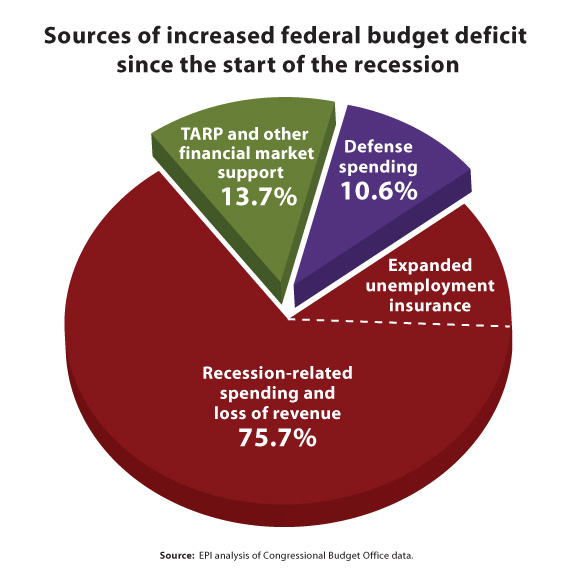The large majority of the increase in the federal budget deficit in recent years is a direct result of the recession, which has left millions of workers unemployed or underemployed, reducing tax receipts and requiring increased safety net spending. Further, explicitly temporary policy responses to the recession such as the Recovery Act have added to the deficit in recent years but will be withdrawn when the economy recovers. The Chart identifies three key sources of the projected $1.2 trillion increase in the federal budget deficit since the start of the recession through 2010. By far the largest slice—more than 75%—is the result of the recession and the jobs crisis, which reduced revenue from income tax and lower property values and led to increased spending on unemployment insurance, food stamps, other safety net programs, as well as infrastructure projects aimed at both putting people back to work and building the foundation for durable future growth.

It is important to note, however, that while the jobs lost due to the recession contribute to a higher deficit in a variety of ways, unemployment insurance payments are a relatively small factor. Expanded unemployment insurance payments account for 11.4% of the increase in the deficit since the recession began. Just as the deficit grows when people lose their jobs and have their hours cut back, it will decrease when an improved economy puts people back to work. Because of this, the headline costs of job-creation strategies like extending unemployment insurance overstate their (already small) actual impact on the deficit. A recent paper found that the expansion of unemployment insurance since the start of the recession boosted GDP by 1.7% and added more than 1.7 million full-time equivalent jobs to the economy. Because these investments put people back to work, triggering increased tax revenues and reduced safety net spending, roughly half of their headline costs are actually recouped. In the meantime, it’s important to know the real source of today’s large deficits: the recession and the temporary policy responses put into place to fight it.
